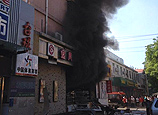
COFCO Property (Group) Co, the real estate unit controlled by State-owned food company COFCO Corp, bought a 206,000 square meter plot of land in Beijing's Chaoyang district at 2.36 billion yuan ($384.68 million), the company said in a filing on the Shenzhen Stock Exchange Wednesday.
The price of the 49,000 square meter commercial building portion of the plot was around 46,000 yuan per square meter, breaking a record set by property developer Sinobo last year when it bought a piece of land for 34,000 yuan per square meter.
Another developer, Longfor Group, bought a nearby piece of land in September 2012 at 20,000 yuan per square meter. Land prices in the area have soared nearly 130 percent over the past 10 months.
The COFCO land, which is located in northeastern Beijing between the Fifth and Sixth Ring Roads, was bought at a premium of 49.37 percent compared with the starting price of 1.58 billion yuan.
"News of such prime sites may push up consumers' expectations on the real estate market, so property transactions and prices could also get a boost in the short term," Liu Yuan, a senior research manager at Centaline China Real Estate, told the Global Times Wednesday.
Some media reports said Wednesday that given the high cost, the final sale price of the project after development may reach as much as 100,000 yuan per square meter.
The real estate market in Beijing and other first- and second-tier cities has been very active during the past few months, although major cities announced detailed regulations in March to cool down the housing market, which were called "the strictest" by some experts.
Strong property sales and prices in first- and second-tier cities are mainly backed by strong rigid demand, and housing prices are expected to grow moderately in the next few years, according to Liu.
In June, 63 of 70 surveyed major cities in China reported increasing new-home prices on a month-on-month basis and 69 cities reported year-on-year growth, according to the National Bureau of Statistics on July 18. But month-on-month growth has shown signs of slowdown.
Though the new leadership has still not spelled out its policies on the real estate sector, experts noted that there would not be any major changes to the existing curbing policies.
"Given the slowing economy, it is not very likely for the government to roll out new curbing policies on the property sector, as a slowing real estate sector may further hamper economic growth," Chen Guoqiang, vice-president of the China Real Estate Society, told the Global Times Wednesday.
Media reports said last week that the State Administration of Taxation is considering expanding the current housing property tax pilot scheme, which started in 2011 in the Chongqing and Shanghai municipalities.
















 People hold funeral for deceased relatives in quake-hit region
People hold funeral for deceased relatives in quake-hit region


![]()
